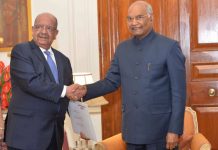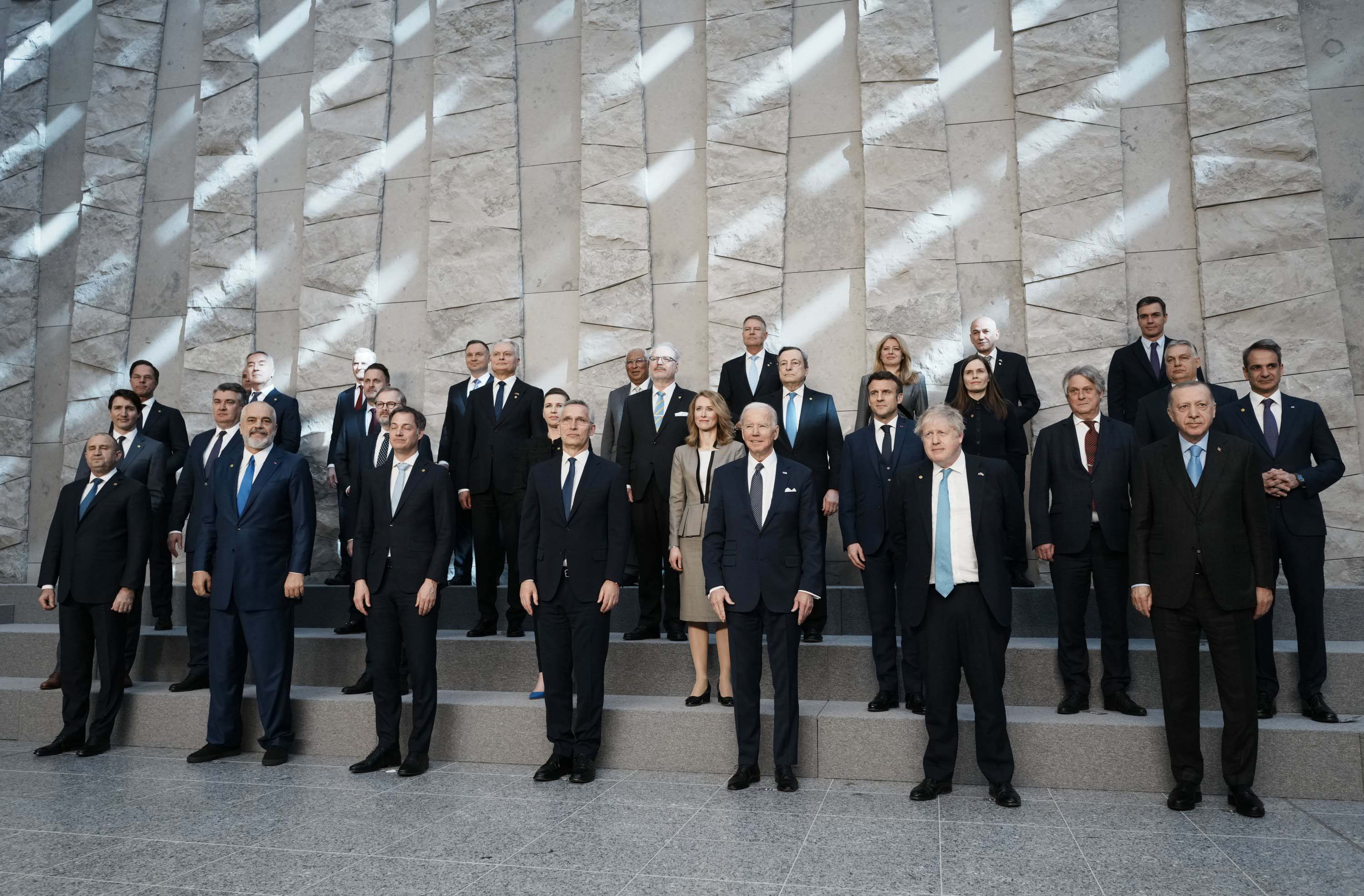
The Western alliance decides to keep vigil on Chinese ambitions even as it gives Russia a window to exit from the Ukraine war. But will Russia play the ball? A report by Gopal Misra
With a firm assurance of the west’s cooperation to Russia, but a decision to keep vigil on the Chinese ambitions and its expansionist programme, NATO and the European Union have finally spelt out their short-term and long-term policies regarding security and peace; thus, ending the common perception that they have been adopting an ambivalent approach.
The NATO’s historic summit also proposes a periodic, focused, and meaningful dialogue with a Russia willing to engage on the basis of reciprocity, with a view to avoiding misunderstanding, miscalculation, and unintended escalation, and to increase transparency and predictability. The NATO document emboldens those seeking peace in Europe by offering an olive branch to Russia. It reiterates that NATO does not seek confrontation and poses no threat to Russia. It, however, cautions that “China’s growing influence and international policies can present challenges that we need to address together as an Alliance,” but further states, “We will engage China with a view to defending the security interests of the Alliance.”
The inability of the world’s big powers to address the two Russian demands, ‘demilitarization’ and ‘denazification’ of Ukraine appears to have finally pushed the peace-loving people of the Eastern Europe to a never-ending conflict, perhaps, awaiting a human tragedy reminding all of us of the World War-II holocaust.
Amidst these developments, the Chinese Foreign Minister, Wang Yi, who just had been to Islamabad and Kabul, arrived in New Delhi on March 24-25, inviting his counterpart Jaishankar to Beijing, thus resuming high-level bilateral engagements between the two countries, which had disrupted following the Galwan Valley clashes in Ladakh on the India-Tibet border in 2020. Wang’s presence could have elated any peace-loving person, but only a day before at Islamabad, he had demanded ‘plebiscite in Kashmir. He then flies to Kabul and reportedly assures the Taliban Government that China would be getting them international recognition soon. If India could be placated, the three countries, Russia, China and India would soon be legitimizing their rule; thus China targets India as a part of its renewed diplomatic offensive.
It is yet to be confirmed what exactly transpired between Wang and the Indian functionaries, including India’s National Security Advisor, Ajit Doval. It appears that no formal meeting between the Indian Prime Minister, Narendra Modi and Wan could take place, because he did not bring any substantial proposal for peace on the India-Tibet borders. It, however, is obvious that if the Chinese President Xi Jinping had been serious about the Russia, India China (RIC) alliance that was being emphasised by the Russian President, Vladimir Putin, for the past several months, he could have already withdrawn the Peoples’ Liberation Army from the borders in the high Himalayas. The Indian side has reiterated that the withdrawal of the troops is essential for any meaningful dialogue between the two neighbours.
The NATO resolution, meanwhile, also discusses in detail about China’s stated ambitions and assertive behaviour which presents systemic challenges to the rules-based international order and to areas relevant to Alliance security. We are concerned by those coercive policies which stand in contrast to the fundamental values enshrined in the Washington Treaty. The philosophy of the Treaty, which was signed on April 4, 1949, is being recalled in context of China rapidly expanding its nuclear arsenal with more warheads and a larger number of sophisticated delivery systems to establish a nuclear triad. It is opaque in implementing its military modernisation and its publicly declared military-civil fusion strategy. It is also cooperating militarily with Russia, including through participation in Russian exercises in the Euro-Atlantic area. The NATO leadership is also alarmed by China’s frequent lack of transparency and use of disinformation.
Biden’s Initiative
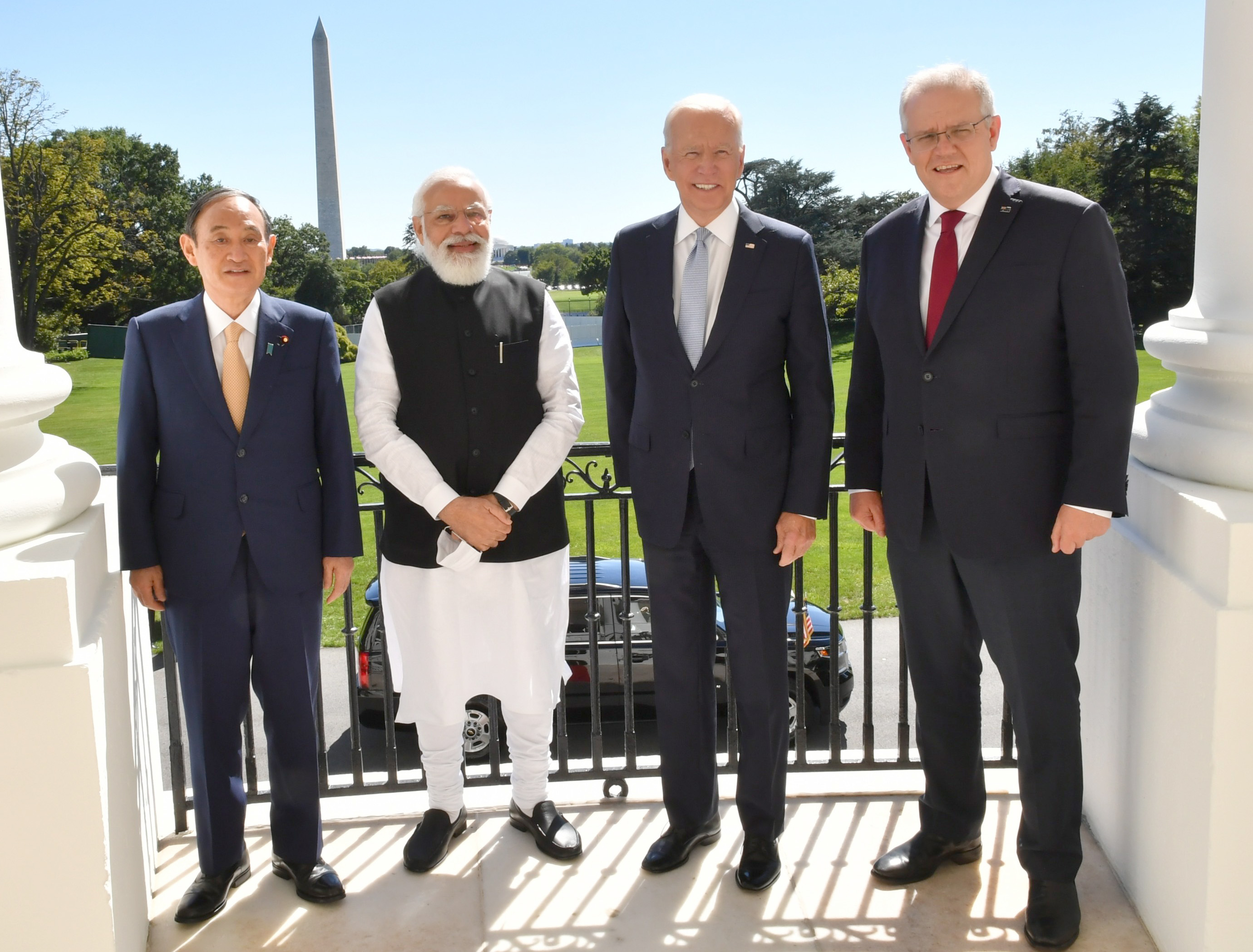
The NATO document reasserts the world-view of American President, Joe Biden. He, perhaps, was at his best, when he persuaded the leaders of the US-led NATO to converge in Brussels, for ending the present stalemate or seize in the global politics. It is a historical document unanimously agreed upon delineating the goal for peace accompanied by the details of the threats to the peace too. It spells out two important factors that the first world stands for democracy and human rights and it was decided to respect the established boundaries of the nation state. Biden’s presence amidst the ongoing war in Russia and Ukraine has further augmented the commitment of the free world towards peace and prosperity.
The NATO resolution cautions that “We are increasingly confronted by cyber, hybrid, and other asymmetric threats, including disinformation campaigns, and by the malicious use of ever-more sophisticated emerging and disruptive technologies. Rapid advances in the space domain are affecting our security.” The issue of the proliferation of weapons of mass destruction and the erosion of the arms control architecture was also discussed, which undermines the collective security.” The reference to the climate change and human rights is believed to be included in the document on the advice of Biden.
Assurance to Russia
The NATO document says that “The decisions we have taken are fully consistent with our international commitments, and therefore cannot be regarded by anyone as contradicting the NATO-Russia Founding Act.”
It also calls upon Russia to rescind the designation of the Czech Republic and the United States as “unfriendly countries” and to refrain from taking any other steps inconsistent with the Vienna Convention on Diplomatic Relations. It, however, cautions about Russia’s growing multi-domain military build-up, more assertive posture, novel military capabilities, and provocative activities, including near NATO borders, as well as its large-scale no-notice and snap exercises, the continued military build-up in Crimea, the deployment of modern dual-capable missiles in Kaliningrad, military integration with Belarus, and repeated violations of NATO Allied airspace, which increasingly threaten the security of the Euro-Atlantic area and contribute to instability along NATO borders and beyond.
Assurance to Ukraine
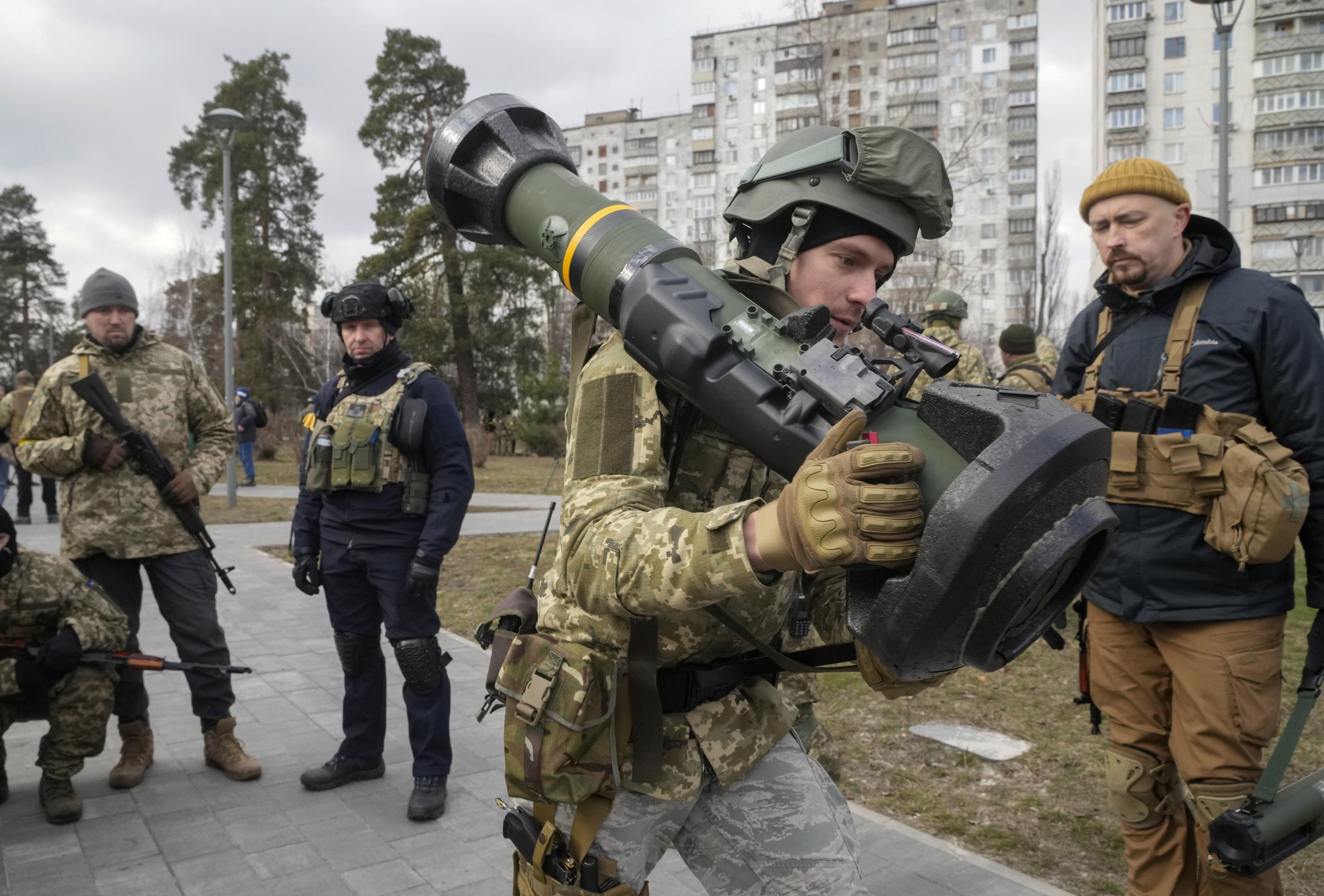
The NATO resolution specifically announces that “We reiterate our support for the territorial integrity and sovereignty of Ukraine, Georgia, and the Republic of Moldova within their internationally recognised borders. In accordance with its international commitments, we call on Russia to withdraw the forces it has stationed in all three countries without their consent. We strongly condemn and will not recognise Russia’s illegal and illegitimate annexation of Crimea, and denounce its temporary occupation.”
The resolution further cautions that “We are increasingly confronted by cyber, hybrid, and other asymmetric threats, including disinformation campaigns.” It further states that “the malicious use of ever-more sophisticated emerging and disruptive technologies and also rapid advances in the space domain are affecting our security.”
The NATO document could have become more effective if it had spelt out the corrective steps being proposed regarding the proliferation of weapons of mass destruction and the erosion of the arms control architecture. It is necessary for the people to know why the western powers and the then USSR did not ratify the Strategic Arms Limitation Talks=II talks, which later agreed upon as STARTs, though agreed upon between the USA and Russia in 1993 has never been ratified by the USA. In February 2011 a new treaty was proposed and eventually ratified in 2011. However, if the NATO powers are keen to attain their goals for peace by 2030, the issue of the trust deficit among major world powers must be addressed.
The Multi-faceted Threat
The NATO leaders have accepted the existence of the multifaceted threats, systemic competition from assertive and authoritarian powers, as well as growing security challenges to the democratic countries and their citizens from all strategic directions. They, however, have to reinvent strategies to deal with these challenges. If they had accommodated Russia as a European power, the Ukrenian war might have been averted.
The issue before NATO is not only Russia’s aggressive actions constituting a threat to Euro-Atlantic security; but terrorism in all its forms and manifestations remains a persistent threat. It further stated that the state and non-state actors are challenging the rules-based international order and threats to undermine democracy across the globe.
The NATO summit has also paved the way for larger cooperation and dialogue with European Union, aspirant countries and our partners in the Asia Pacific, and strengthens our engagement with key global actors and other new interlocutors beyond the Euro-Atlantic area, including from Africa, Asia and Latin America.
A NATO Office in Kabul
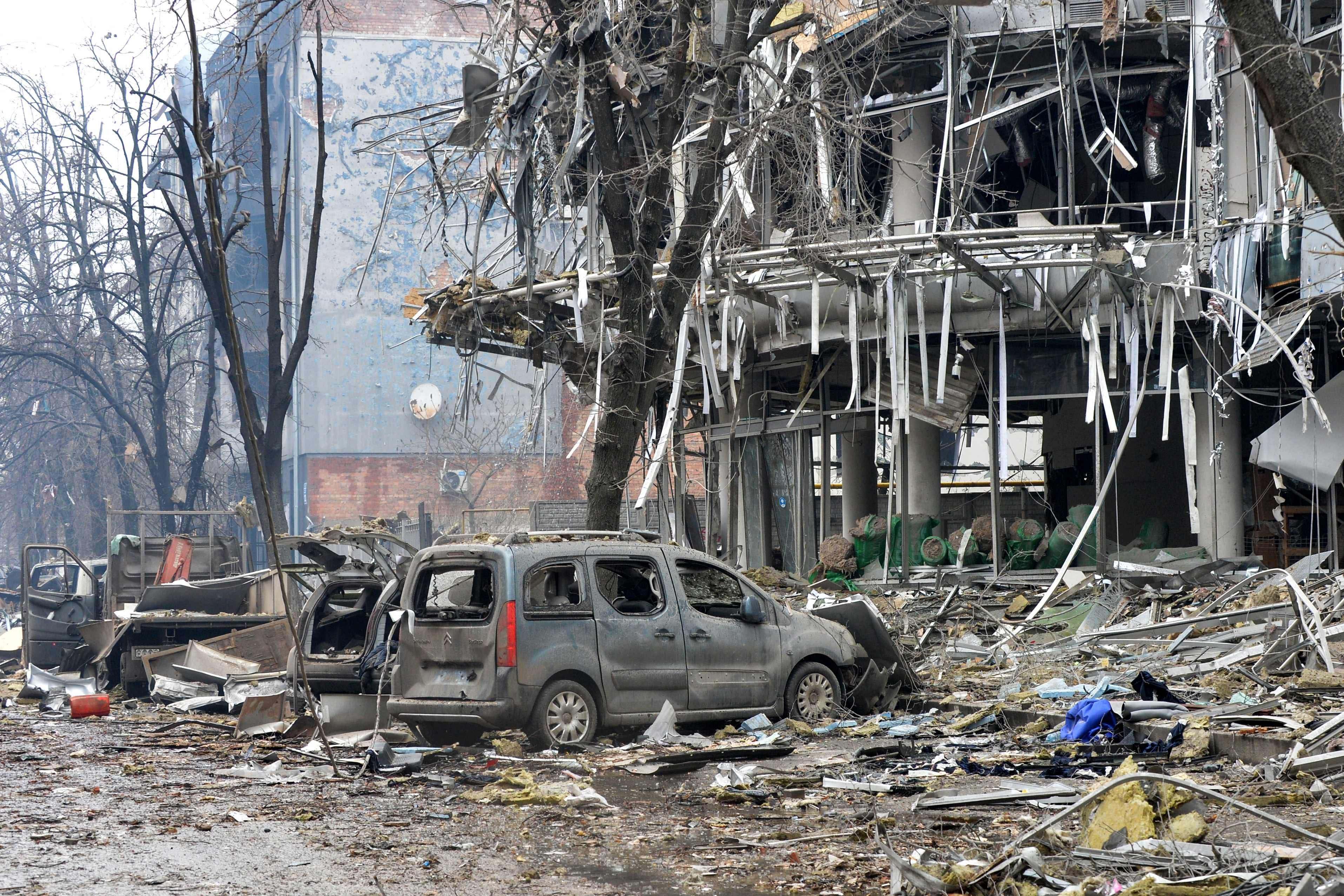
The summit resolution stated that withdrawing our troops does not mean ending our relationship with Afghanistan. The NATO alliance has reaffirmed its commitment to continue to stand with Afghanistan, its people, and its institutions in promoting security and upholding the hard-won gains of the last 20 years. The NATO alliance reiterated that it would continue to provide training and financial support to the Afghan National Defence and Security Forces, including through the Afghan National Army Trust Fund. NATO will retain a Senior Civilian Representative’s Office in Kabul to continue diplomatic engagement and enhance our partnership with Afghanistan. Recognising its importance to an enduring diplomatic and international presence, as well as to Afghanistan’s connectivity with the world, NATO will provide transitional funding to ensure continued functioning of Hamid Karzai International Airport. We will also step up dialogue on Afghanistan with relevant international and regional partners. The NATO would continue to support the ongoing Afghan-owned and Afghan-led peace process, and call on all stakeholders to help Afghanistan foster a lasting inclusive political settlement that puts an end to violence; safeguards the human rights of Afghans, particularly women, children, and minorities; upholds the rule of law; and ensures that Afghanistan never again serves as a safe haven for terrorists.
Europe’s Neutral Countries
Within Europe, the NATO summit has decided for enhancing cooperation with our Enhanced Opportunities Partners, Finland and Sweden, especially in the context of crisis management preparation, exercises, and exchanging information and analysis, notably on the security situation in the Baltic Sea region. Interestingly, Finns and Swedes were never keen to join the military alliance. However, the Russia’s invasion of Ukraine appears to be changing their old policy. A poll commissioned by Finnish broadcaster YLE this week showed that, for the first time, more than 50% of Finns support joining the Western military alliance. In neighbouring Sweden, a similar poll showed those in favor of NATO membership outnumbered those against joining the NATO. The attack on Ukraine has also prompted both Finland and Sweden to break with their policy of not providing arms to countries at war by sending assault rifles and anti-tank weapons to Kyiv. For Sweden, it’s the first time offering military aid since 1939, when it assisted Finland against the Soviet Union.
The government of the two countries have aggressively reacted to the Russian reaction against their joining NATO. In their reply to the Russian Foreign Ministry’s statement that the efforts by the United States and some of its allies to “drag” Finland and Sweden into NATO and warned that Moscow would be forced to take retaliatory measures; however, the governments of Sweden and Finland have sharply reacted that they won’t let Moscow dictate their security policy. The Swedish Prime Minister Magdalena Andersson has stated that “It is Sweden that itself and independently decides on our security policy line.” During the post-war period, however, Finland pursued pragmatic political and economic ties with Moscow, remaining militarily nonaligned and a neutral buffer between East and West. Sweden has avoided military alliances for more than 200 years, choosing a path of peace after centuries of warfare with its neighbours. It may be noted that Finland shares a 1,340-kilometer border with Russia and it had been in war with Russia during the era of the Swedish kings.
The Future of QUAD
The purpose of the visit of Wan to New Delhi was also to wean away India from the QUAD, a non-military alliance, which China believes as an extension of NATO. During the Brussels meeting, the security issues in the Asia-Pacific regions comprising Australia, Japan, New Zealand, and the Republic of Korea was also taken up. In a bid to expand closer ties with the non-NATO members, it was decided to intensify political dialogue and practical cooperation with our partners in the region.
In a bid to curtail the growing Chinese influence in the northern Africa, the NATO summit has decided to strengthen its political dialogue with the Middle East and North Africa (MENA) region. It has also been decided to reinvigorate the alliance’s Mediterranean Dialogue (MD) and Istanbul Cooperation Initiative (ICI) partners. This will build stronger security and defence institutions and capacities, promote interoperability, and help to counter terrorism. The crisis in Libya was also discussed and it was decided to endorse the Un Security Council resolutions passed in 2020 in this regard. The NATO leadership has realized the growing threats of the Cyber penetration in its information systems. The 79-point detailed communiqué issued on behalf of the NATO headquarters states that the coalition of the western powers has set goals for the next eight years regarding its economic and strategic ties.
Inspite of China’s disapproval, Australia, India, Japan and the United States have formed an informal alliance for strengthening their cooperation under the banner of ‘Quad’. China has called it a defence partnership like the NATO. However, the US President Joe Biden has denied it, and stated “We are four major democracies with a long history of cooperation,” at the Quad Leaders’ Summit at the White House in Washington on September 24, 2021. “We know how to get things done, and we are up to the challenge.” Biden, along with Australian Prime Minister Scott Morrison, Indian Prime Minister Narendra Modi and the then Japanese Prime Minister Yoshihide Suga, had discussed their common efforts in fighting COVID-19, the climate crisis and other challenges, as well as new initiatives to improve understanding between the people of the Indo-Pacific nations.
The Mercenaries in Ukraine

The presence of thousands of mercenaries in the ongoing Russian-Ukrainian conflict, and the never-ending Anglo-American obsession against Russia has not only made peace elusive in the Eastern Europe, it may also adversely affect peace in the other parts of the world, if China too decides to annex Taiwan, inspire of repeated warnings by Joe Biden.
The Indian stand of keeping her neutrality in this complex war was reiterated during the visit of the Japanese Prime Minister, Fumio Kishida, to New Delhi in the third week of March, that “there is no other choice but the path of dialogue and diplomacy for the resolution of the conflict”, but this neutrality will not be extended to QUAD, the Indian policy makers have reportedly told the Japanese Prime Minister. India is also convinced that this avoidable war, perhaps, is caused by the British-American obsession against Russia. It could be traced to the past history of Russian expansionism in Central Asia during Tsars and its initial support to Nazis during the World War-II.
The NATO resolution is an out-of-box initiative, but the situation continues to be grim due to the large scale induction of mercenary soldiers on both sides of the Russia-Ukraine conflict, the peace is likely to remain elusive; even a prompt ceasefire may not ensure permanent peace in this war. If a Russian outfits offers ‘salo’, a popular pork fat of Ukraine to lure private soldiers to the conflict zone, the opposite side, liberally funded by the western powers, is reportedly offering up to USD 2000 (Rs. 1.40 lakhs) per day to these armed volunteers ready to fight anywhere.
The Wagner Group, which reportedly had tried to assassinate the Ukrainian President Volodymyr Zelenskyy, twice has now been reportedly activated in the Donabas region, which has recently been recognized as an independent country by Russia. Meanwhile, the Chechen Muslims are fighting on both sides. While the pro-Putin group led by Ramzan Kadyrov ‘s fighters have reportedly taken an airfield north of Kyiv and are also part of the Russian forces moving towards the capital.
The anti-Russian Chechens too have reportedly joined the war. The veterans of the two Chechen wars against Russia in 1994–1996 and 1999–2009 are now reportedly fighting against Russia in Ukraine. Earlier, two Chechen volunteers known as the Sheikh Mansur and the Dzhokhar Dudayev battalions have been fighting against Russian-backed separatists and regular Russian forces in the Donbas since 2014. Earlier, on February 27, Adam Osmayev, the commander of the Dzhokhar Dudayev Battalion, had vowed to help Ukraine win. He announced in a video message that ‘I want to tell Ukrainians that real Chechens, today, are defending Ukraine’, Osmayev said. ‘We have fought, and will continue to fight for Ukraine until the very end. He also appealed to Chechens fighting in the Russian National Guard to switch sides, and stated, ‘Because the whole civilised world helps Ukraine. Therefore, I also urge them to go over to the side of Ukraine. Here, even among the command staff, generals, there are people of Chechen nationality, and they will take care of you. I also urge all relatives and friends of these people to take their children away from here as soon as possible.’
The Talks among World Leaders
A few days before the crucial summit between the US President, Joe Biden and the Chinese President, XI Jinping, the spokesman of China’s Ministry of Foreign Affairs, Zhao Lijian, had insisted that China’s position on the Russian-Ukrainian conflict has always been ‘consistent and rounded’, and rejected the observation that it had any incongruity. His statement was quite meaningful, when he stated, “It is those countries that delude themselves into thinking that they can lord it over the world after winning the Cold War, those that keep driving NATO’s eastward expansion five times in disregard of other countries’ security concerns, and those that wage wars across the globe while accusing other countries of being belligerent, that should really feel ‘uncomfortable’.”
The Chinese statement was further augmented, when the Russian Foreign Minister, Sergei Lavrov, challenged the western powers. He stated, “Russia has lost any illusions about ever relying on the West and Moscow will never accept a world order dominated by the United States, which is acting like a sheriff seeking to call all the shots in a saloon bar.”
The US President Joe Biden and Chinese leader Xi Jinping talks appeared to be filled with the usual American rhetoric. Before this crucial summit dialogue, the secret parleys between Yang Jiechi, director of China’s Central Foreign Affairs Commission, and US National Security Advisor, Jake Sullivan, in Rome had paved the way for the high-level talks. The Chinese side did not disclose the details of the discussions. It, however, admitted that the talks were “frank, in-depth and constructive” and included a discussion on Taiwan. It is believed that America has assured China that it had no intention to recognize Taiwan as a free and sovereign country. The erstwhile Secretary of State, Mike Pompeo, who had been in Taiwan in March, demanded that the USA must recognize Taiwan as a sovereign country. At present, the USA is maintaining its ties with Taiwan under the Taiwan Relations Act enacted in 1979. It is also believed that America has also assured to withdraw the heavy tariffs imposed on the Chinese goods during the Trump administration. On its part, China has reportedly assured that it would continue its policy towards the Russian annexation of Crimea. Similarly, it would also not legitimatize the two regions of Ukraine as independent countries. Biden’s warning to China that it would have to bear the cost, if helps Russia is mostly considered a part of the American rhetoric. It appears that the talks between Sullivan and Yang Jiechi, held what the White House called a “substantial” seven hour meeting in Rome had set the agenda for the summit. It is yet to be seen how much the talks would impact the ongoing European war.
The American side claims that Biden has given clear message to China to give up any idea of bailing out Russia from the effects of Western sanctions or even sending military assistance for Russia’s onslaught against neighbouring Ukraine. The Chinese television channels have stated that Xi Jinping said conflicts between states are “in no-one’s interest” during the video call. He further stated,” Peace and security are the most valued treasures of the international community.”
Private military firms
The unrests, conflicts and wars in various parts of the world have triggered off huge business possibilities for the private military companies. They gather intelligence information, provide security to the rich and powerful and also supply mercenaries across the globe. It is estimated that their business would reach to USD 475 million by 2030.
There are a number of private security companies having headquarters in the USA, the U.K. and South Africa such as the Silent Professionals, Mosaic, Sandline International and Executive Outcomes, which have become active in the war-torn Ukraine. The Executive Outcomes had been active during the 1990s on behalf of Angola and Sierra Leone. The Mosaic, a US-based intelligence company has already been functioning in Ukraine since 2014. It is known as one of the finest outfits in gathering intelligence and helping the politically exposed people to safer places.
Another private outfit, Blackwater, had played a key-role during the civil war in Yugoslavia. Apart from collecting intelligence information, it had helped Bosnian and creation forces in evacuating their people to safer places.
QUAD conundrum
During the visit of the Japanese Prime Minister, Kishida, India issued a separate statement, which underlined that the QUAD must remain focussed on its core objective in the Indo-Pacific region of promoting peace, stability and prosperity. Among the four countries of QUAD, India had abstained in the UN Security Council condemning the Russian forces’ march into Ukraine. The other three countries, Japan, Australia, and the USA had voted against Russia.
India cautioned against ending on wrong side of history
The Indian budget for the financial year 2021-22 has its calculations on the prices of USD 75 per barrel crude oil, but during the month-long Ukraine War, the prices have shot up to USD 140 per barrel. Interestingly, the Russian imports are not substantial to meet India’s requirement of five million barrel per day. Her import of crude oil from Russia has been on average 203,000 barrels per day, which has increased to nearly 360,000 barrels per day. However, the USA has adopted a moralistic stand that crude oil purchases by India would not violate US sanctions, but India is being cautioned that it might put her on the wrong side of history.
Russia seize initiative with Kinzhal missile
The Ukrainian War has enabled Russia and the western powers to test their state-of-the art weapons. The US President, Biden has announced that America would soon be providing much more lethal weapons to Ukraine, but it appears the Russians have taken the initiative with the launching of hypersonic missile attacks on the Ukrainian targets, especially the secret warehouses of weapons. It is known as Kinzhal, meaning dagger. It hit a Ukrainian fuel depot near the Black Sea port of Mykolaiv. It is about 1500 kilometres from Poland, which was a member of the Warsaw Pact during the USSR era, but has recently joined NATO.
The defence experts believe that with the frequent use of the Kinzhal missile, which has range of 2000 kilometres having the speed ten times more than the sound, is warning signal to the newly baptized countries of the Eastern Europe in NATO that they cannot escape the wrath of the Russian bear.
Meanwhile, thousands of Ukrainians from the besieged port city of Mariupol have been forcefully taken across the Russian borders and are being kept in camps. There are reports that their mobile phones and other electronic gadgets are being checked for obtaining information.








